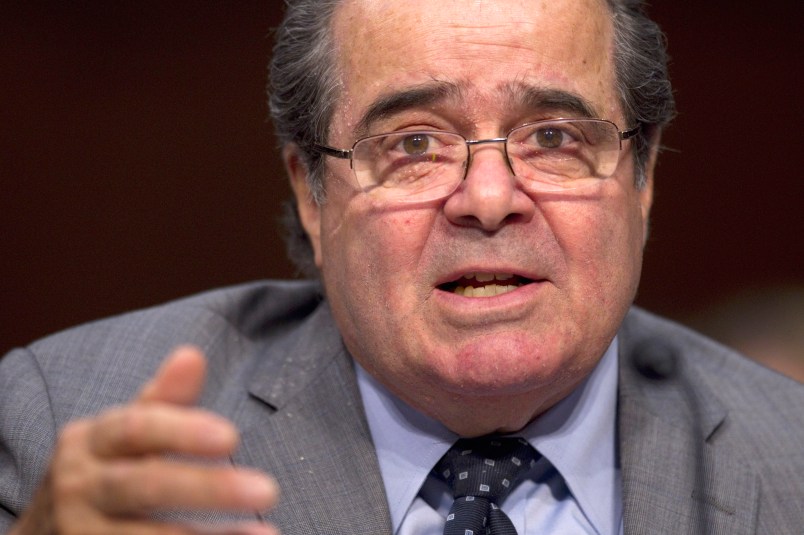When the Supreme Court hears two landmark cases about birth control on Tuesday, few observers doubt that Justice Antonin Scalia’s sympathies will be with the Christian business owners who charge that the mandate violates their religious liberties.
The Reagan-appointed jurist is a devout Catholic who has extolled “traditional Christian virtues” and insists the devil is “a real person.” He even has a son who’s a Catholic priest. He voted in 2012 to wipe out Obamacare in its entirety and has been President Barack Obama’s most outspoken foe on the Supreme Court.
And yet, Scalia’s past jurisprudence stands contradictory to the argument for striking down the Obamacare rule in question, which requires for-profit employers’ insurance plans to cover contraceptives (like Plan B, Ella and intrauterine devices) for female employees without co-pays.
In 1990, Scalia wrote the majority opinion in Employment Division v. Smith, concluding that the First Amendment “does not require” the government to grant “religious exemptions” from generally applicable laws or civic obligations. The case was brought by two men in Oregon who sued the state for denying them unemployment benefits after they were fired from their jobs for ingesting peyote, which they said they did because of their Native American religious beliefs.
“[T]he right of free exercise does not relieve an individual of the obligation to comply with a valid and neutral law of general applicability,” Scalia wrote in the 6-3 majority decision, going on to aggressively argue that such exemptions could be a slippery slope to lawlessness and that “[a]ny society adopting such a system would be courting anarchy.”
“The rule respondents favor would open the prospect of constitutionally required religious exemptions from civic obligations of almost every conceivable kind,” he wrote, “ranging from compulsory military service, to the payment of taxes, to health and safety regulation such as manslaughter and child neglect laws, compulsory vaccination laws, drug laws, and traffic laws; to social welfare legislation such as minimum wage laws, child labor laws, animal cruelty laws, environmental protection laws, and laws providing for equality of opportunity for the races.”
That opinion could haunt the jurist if he seeks to invalidate the birth control rule.
“Scalia will have to reckon with his own concern in Smith about the lawlessness and chaos created by liberal exemptions to generally applicable law,” said Adam Winkler, a constitutional law professor at UCLA. “For him to uphold an exemption now is to invite more of the lawlessness that he warned about.”
Michael C. Dorf, a law professor at Cornell, also addressed the tension.
“Justice Scalia’s opinion in the Smith case offered a number of grounds for the conclusion that the Free Exercise Clause does not entitle religious objectors to exceptions from neutral laws of general application,” Dorf wrote in SCOTUSblog, observing that Scalia also posited that judges weren’t “competent” to decide which religions were deserving of exemptions.
In response to Scalia’s decision, Congress passed the Religious Freedom Restoration Act in 1993, which says any law that “substantially burden[s]” a person’s exercise of religion must demonstrate a “compelling governmental interest” and employ the “least restrictive means” of furthering that interest. That’s the basis under which Hobby Lobby and Conestoga Wood, two businesses with religious owners, are suing for relief from the birth control rule.
And that might offer Scalia an escape hatch. Experts say he could conceivably decide that the First Amendment doesn’t permit a religious entity to be exempt from the law but that RFRA suffices to let Hobby Lobby and certain others off the hook from the birth control rule. But even then, the RFRA argument isn’t clear-cut. Nineteen Democratic senators who voted for the law in 1993 have filed an amicus brief insisting that it doesn’t — and was never intended to — give for-profit companies a pass on the law.
It’s up to Scalia and the other justices to parse that question. If he axes the mandate on the basis of RFRA, he still has to contend with his earlier argument that such an outcome carries grave dangers for the rule of law.
“To permit this,” he wrote in Smith, quoting from an old court decision, “would be to make the professed doctrines of religious belief superior to the law of the land, and in effect to permit every citizen to become a law unto himself.”
This article has been updated to clarify the religious background of the plaintiffs.






